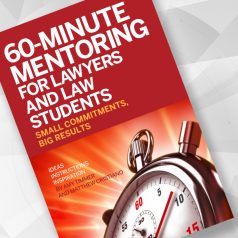Young lawyers often reach out to me as a mentor when they’re thinking of changing jobs, whether that is to another firm, toward being in-house counsel, or away from the practice of law altogether. Contrary to what most of them expect to hear, I can’t answer that question for anyone. The answer reveals itself after we talk through some considerations. If you find yourself feeling stagnant and wanting to explore a move, perhaps this exercise can help you as well.
Changing Jobs: Reason for Leaving
It is surprising how many young lawyers haven’t really thought about why they want to make a change. Without knowing the exact reasons, the old adage “the grass isn’t always greener” can ring true. You could leave one situation for an equal or worse situation just as easily as a better one — if you haven’t taken the time to figure out what you’re running away from or looking for.
- Is it a particular partner, group or practice?
- Is it compensation or benefits?
- Are you growing?
- Is there a lack of mentoring, training or diversity?
- Is it the number of billables or the expectation to bring in business?
- Do you get meaningful work and get exposure to clients?
- What does the partner track look like and do you want it?
- Do you have a life outside of work?
- Is it the culture?
Once you have a list of what’s missing and what you want, you can figure out whether those things can change at your current place of work with artful advocacy and political navigation. Or, it will become more clear that what you want can only be gained by a move. This list will also help you analyze opportunities as they unfold, acting like a measuring stick.
Your “State of the Union” Pros and Cons List
I recommend getting into the practice of creating a pros and cons list for your current job every couple of years, even if you’re content. This “state of the union” exercise can be a great litmus test for yourself — whether you’re happy or need to stretch yourself where you are or need to consider a change.
Skills and Talents
When considering changing jobs, it is also helpful to think about what you are naturally good at. What are your strengths and talents? What comes easily to you? In what circumstances or situations do you really shine? This analysis is especially helpful if you’re considering going in-house or leaving the practice of law to see if your skills and talents line up with those opportunities.
Here, instead of a pros and cons list, I like to use a three-columned list with the headings “A,” “B” and “C” to resemble school grades. Feel free to use your own terms of measurement like “Great,” “Good” and “Mediocre.” Then with blunt honesty and self-awareness, analyze your skills against those buckets. (Don’t worry – it’s just for you!) For example, I’d probably put “thinking on my feet” under B, “client relations” under A and “legal writing” under C.
The “why” behind this list is that ideally, you’d look for an opportunity that allows you to exercise skills in the A and B categories more than the C category.
Goals, Passions and Desires
While this may sound like a no-brainer, you’d be surprised how many young lawyers get stumped when I ask them the simple question, “What do you want?” or “What do you like to do?” It is important to your mental health and career satisfaction to do things that you like. Note that I don’t use the word “love.” Contrary to popular opinion, I do not believe you have to love your job or love being a lawyer. At the same time, life is too short to do something you hate. It just takes too much energy that could be better spent on other endeavors.
Here, I like to use another three-columned list to analyze parts of a job, headed “Love,” “Like” and “Dislike/hate.” For example, I’d probably put billable hour and discovery under Dislike/hate, oral argument and mentoring associates under Love, and drafting summary judgments under the Like column.
The use case for this list is that you’d look for an opportunity where you could do more of what you love and like and less of the things in the dislike or hate bucket.
Grow Where You’re Planted or Move With Intention
Finally, even though I’m a huge advocate for this introspective work, don’t let your desire for the “perfect” or “dream” job be the enemy of good enough. As a young lawyer, you have a long career trajectory — that next job doesn’t have to be your forever job. The truth is that if you try it and find out you don’t like it, you can move again. While there is some stigma with changing jobs too often, life is too short to be miserable. As long as you do your best to learn and grow where you’re planted and move with intention, odds are in your favor.
Illustration ©iStockPhoto.com
Subscribe to Attorney at Work
Get really good ideas every day to help you create a fulfilling, successful law practice: Subscribe to the Daily Dispatch (it’s free).
YOU CAN NEVER HAVE TOO MANY MENTORS
























